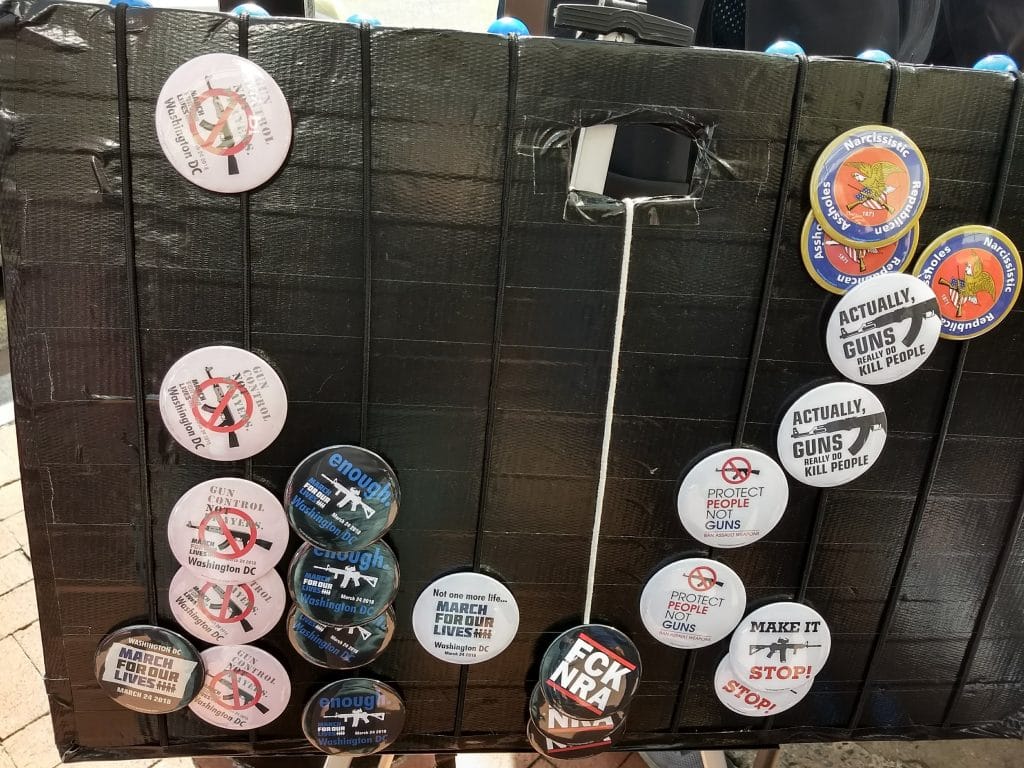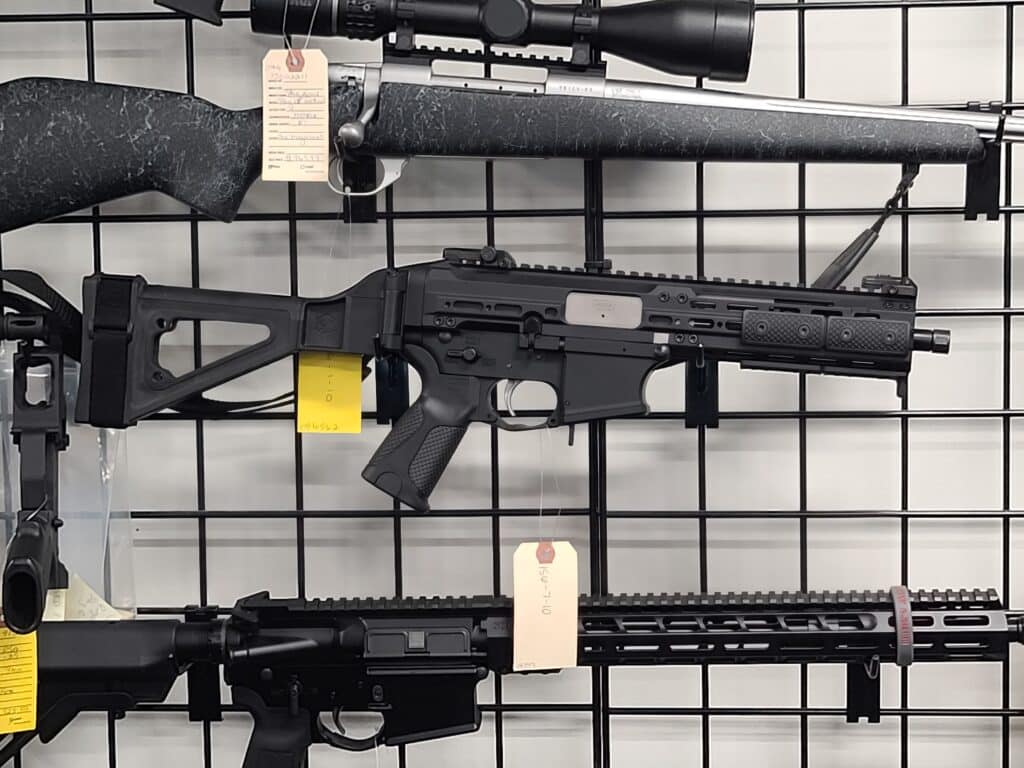This week has seen quite a bit of bad news for gun-rights advocates.
First, the Senate balked at repealing the pistol-brace ban. I lay out why that’s not just a political defeat, but a setback for the legal fight against the rule too.
Then we got a new Pew poll that shows gun control is now the leading motivator among Democratic voters. And, as Contributing Writer Jake Fogleman explains, it’s part of a recent trend of Americans wanting more gun restrictions which has endured even as we’ve moved further out from the most recent high-profile mass shooting. That could be part of the reason why zero Democratic Senators voted against the brace ban.
We’ll have to see if this polling turns into electoral victories for candidates that run on gun control. But polling certainly indicates Americans are moving in that direction.
Of course, the political ascent of gun control comes at the same time gun rights have experienced a legal ascent. It’s not clear how those two trends will interact. It’s entirely possible, and very likely in the case of the pistol-brace ban, the courts will simply undo whatever new gun restrictions come from the increased support for new laws.
But, if you’re a gun-rights advocate, you’d rather not have to find that out. It’s always better to persuade people to your point of view than rely on the courts as your only backstop.
Plus, Popehat’s Ken White joins the podcast to discuss Hunter Biden’s plea deal. And you can find me on Cam & Company over at Bearing Arms talking about the deal and the pistol brace situation.

Analysis: A Worrying Sign for Gun-Rights Supporters [Member Exclusive]
By Jake Fogleman
One of the biggest strengths of the gun-rights movement has long been the asymmetry in electoral passion over guns among voters. But that could be changing.
Gun-rights supporters have traditionally been highly passionate about gun policy, willing to engage in the political sphere, and often highly mobilized to vote in elections where they perceive gun rights to be at stake. At the same time, gun-control supporters have tended to be less singularly focused on gun control as a political priority.
Even at times when public sentiment has tilted in favor of stricter gun laws, such as in the aftermath of high-profile mass shootings, the gun-rights position has tended to win the day just based on the simple fact that gun control has typically ranked lower on the priority list of voters who support it, behind more kitchen table issues such as the economy, crime, health care, etc.
Even in instances where the gun-control position has achieved victory in the policy sphere, such as in blue state ballot measures, the margins of those victories have almost unanimously been slimmer than general issue polling would have suggested.
Unfortunately for gun-rights advocates, there’s some early evidence that this might be changing.
A new Pew Research poll released Wednesday found that Democrats and Democratic-leaning independents now rate gun violence as the top problem facing the country, with 81 percent saying it is “a very big problem.” That puts it ahead of other typical Democratic staple issues such as health care costs, climate change, racial justice issues, and even more unanimous kitchen table issues like inflation and K-12 education.
While Pew did not release the crosstabs that would allow measurement of Democratic responses over time, the data they did release show that Americans overall have grown increasingly concerned with gun violence over the last seven years. The number of respondents who say gun violence is a “very big problem” has increased 12 percent since 2016 and is up nine percent since just May of last year.
To be sure, a steady uptick in concern over gun violence alone is not dispositive of growing support for gun control. One could presumably be concerned with “gun violence” and not favor tighter restrictions on gun ownership as a solution.
There’s also clearly a partisan dynamic going on in the Pew poll that makes those distinctions hard to separate. For instance, while 81 percent of Democratic-leaning respondents said they were most concerned with “gun violence,” only 38 percent of Republican learners are, that relationship flipped when the term “violent crime” was invoked. On that issue, Republican-leaning respondents were twelve points more likely to say it is a very big problem compared with Democrats.
But that partisan split over terms does suggest, at least at some level, concern over gun violence could be coded with gun restrictions in mind, entirely separate with “law and order” concerns over general criminality.
The age stratification in who is most concerned is also noteworthy. In the Pew poll, older respondents were 15 points more likely than the youngest respondents, those aged 18-29, to rate gun violence as the issue they think is a very big problem. In other words, those most likely to turn out to vote are becoming the most concerned with guns.
That adds to a growing list of troubling signs in public opinion if you’re a supporter of gun rights. It comes on the heels of last month’s Marist poll showing more Americans than anytime in the previous decade now say reducing gun violence is more important than defending gun rights. A Fox News poll conducted this Spring found that “gun control/violence” was one of the most commonly cited issues offered by registered voters as the most pressing facing the country currently—trailing only the economy and inflation—even without the aid of a prewritten list of options. And finally, Gallup’s most recent poll tracking the issue, released in February, found that Americans overall are more dissatisfied than ever with the country’s gun laws, driven primarily by record-low satisfaction among Democrats and Democratic-leaning independents.
If these trends continue to hold and prove to be sufficiently motivating for people to vote on, gun-rights advocates could soon find that they’ve lost their advantage in ginning up voter turnout. And if the sense of dissatisfaction with current gun laws measured in recent polls is anything close to accurate, the political push for gun control by elected officials will likely accelerate.
Come on the Podcast
One of the many perks of a Reload membership is the opportunity to appear on the podcast. We’ve had a lot of people on the show from all kinds of backgrounds. It’s one of my favorite segments since it gives us all a better insight into the community that makes this publication possible. If you want to come on the show, just reply to this email and let me know!
Podcast: Examining Hunter Biden’s Gun Deal With Popehat’s Ken White [Member Early Access]
By Stephen Gutowski
This week, we’re looking closely at the deal Hunter Biden struck with federal prosecutors over his 2018 gun purchase while he was using illicit drugs.
That’s why I brought on a former federal prosecutor and current criminal defense attorney Ken White. He’s also a podcast host and writes under the name Popehat. So, he’s able to explain the ins and outs of the indictment and give some analysis of the politics of it all too.
White noted that the felony charge Hunter struck a deal on is rarely pursued as a standalone charge. It’s also almost never punished with the maximum possible sentence. He said the pretrial diversion program Hunter and prosecutors agreed to, which includes a lifetime ban on gun ownership, is not an unheard-of consequence for somebody without previous convictions on their record.
He said the charge may not have been brought against other defendants under similar circumstances. But he agreed Hunter may have forced the prosecutors’ hands by publicizing his drug use through a book and media tour.
White also noted the deal does reflect poorly on Hunter’s father because the senior Biden has pursued stricter gun laws in office while his son got himself in this mess. And all of the other controversies surrounding Hunter may leave people feeling he’s received special treatment even if the deal he received was reasonable for the specific charges in the case.
Plus, Contributing Writer Jake Fogleman and I discuss the surprising failure of the pistol-brace ban repeal resolution in the Senate. And Jake tells us about a collectible gun he bought from the Civilian Marksmanship Program.
You can listen to the episode on your favorite podcasting app or by clicking here. Video of the show is available on our YouTube channel. Reload Members get access on Sunday, as always. Everyone else can listen when the show goes public on Monday.

Analysis: What the Pistol-Brace Ban Repeal Defeat Means [Member Exclusive]
By Stephen Gutowski
The Senate voted against undoing President Joe Biden’s pistol-brace ban. That probably won’t have a direct practical impact on the ban’s fate, but it will have a political and, potentially, even a legal one.
On Thursday, the Senate voted 50 to 49 against a resolution to repeal the ATF’s brace rule. The vote was entirely along party lines. Not a single Democrat or Republican crossed over in either direction.
Now, it might not seem like a Senate controlled by the party of the President that instituted the policy refusing to undo it isn’t that unexpected. But there are a couple of reasons this move was surprising.
For starters, this resolution isn’t a standard piece of legislation. If it were, Senate Democrats could have kept it from getting a vote at all or added a bunch of amendments to it. But, since this was a Congressional Review Act (CRA) resolution, it was privileged and got an up or down vote instead.
CRA resolutions have been the primary way Republicans have scored political points against President Biden via legislation since they retook the House in 2022. They’ve managed to push five different resolutions through the House and garner enough Democratic support in the Senate to send them to Biden’s desk. The President has managed to kill all the resolutions by vetoing them, which would require a two-thirds vote of both houses to overcome.
Still, those previous five resolutions pitted Biden and his administration against at least a few Democrats in both houses. The same can’t be said of the pistol-brace ban resolution. While two Democrats in the House voted for it, every Democrat in the Senate rallied to the President’s side.
That may cause political pain for some members who are up for reelection in red or purple states. The rule change effectively bans millions of pistol-brace-equipped firearms, many of which were likely bought years ago, since the vast majority of affected guns have not been registered. So, getting vulnerable Democrats on record supporting it could have some electoral value.
But, as it stands now, the repeal failure is a clear political loss. Instead of making President Biden and Democrats appear divided, it does the exact opposite.
It’s also a potential setback for the legal case against the pistol-brace ban. At the very least, it’s the less ideal outcome because Congress’s opinion of the ATF’s rule is particularly relevant to the challenges.
The key questions at the center of most brace ban lawsuits are not about the Second Amendment. Instead, they’re about the ATF’s power to regulate braced guns and the public’s ability to understand the regulations they hand down. Had Congress been united in passing a resolution declaring the ATF is wrong in how it has reclassified braced guns, that it had overstepped the power granted to it by Congress, that would have provided more ammunition to the groups challenging the legality of the rule on those very grounds.
Instead, Congress is divided on that question. Plaintiffs in the case can point to that division as evidence the ATF doesn’t have clear authority to enact its rule, but the argument is weaker than it otherwise would have been.
Still, that doesn’t mean the pistol-brace ban is going to survive. The cases against it were going well before the repeal resolution passed the House, and the repeal effort losing a 50-49 vote in the Senate is unlikely to sink its legal prospects.
Four federal courts have already issued injections blocking the ATF from enforcing the rule against millions of Americans. A Fifth Circuit Court of Appeals panel got the ball rolling just before the ATF’s grace period for registering the affected guns ended at the beginning of the month by protecting Firearms Policy Coalition members from arrest and prosecution as it prepared to hear the case on the merits. A second court in the same circuit followed up by blocking enforcement against Second Amendment Foundation members. A third extended an injunction to all Gun Owners of America members. The National Rifle Association, which has a separate case in the Eighth Circuit, has asked for a Fifth Circuit judge to extend protections to its members.
The number of people protected under those injections has already grown since they were handed down. The affected gun-rights groups have seen their membership numbers rise, with the Second Amendment Foundation claiming 20,000 new members in the first week after it got its injunction.
A ruling on the merits of the case will probably still come soon. To issue a preliminary injunction against the rule, the Fifth Circuit panel had to conclude that the ban was likely unconstitutional. The Senate’s repeal rejection probably won’t force them to reconsider that conclusion as they begin to hear oral arguments on June 29th. And, as much as it doesn’t help things, the safe money is still on the panel striking the rule down.
Legal action still is, and always was, the most viable path for gun-rights advocates to bring down the brace ban. But the failure to get the repeal resolution through the Senate, even if it would have been doomed by a veto anyway, represents a notable setback nonetheless.
That’s it for now.
I’ll talk to you all again soon.
Thanks,
Stephen Gutowski
Founder
The Reload






